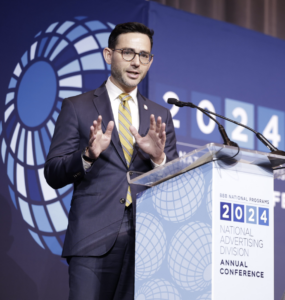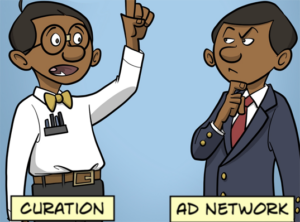Privacy isn’t binary.
Data can be considered either highly private or not, depending on the context in which it’s shared and each individual’s personal preferences, said Chris Mufarrige, director of the Federal Trade Commission’s Bureau of Consumer Protection, speaking at the NAD’s annual conference in Washington, DC, earlier this week.
Any framework for privacy protection “must grapple” with these facts, he said.
Some people just want to be left alone – the I’m-moving-to-a-cabin-in-the-woods crowd – while others simply want the right not be bombarded by invasive telemarketing calls, unwanted emails or other invasions into their private life.
“Privacy is not only hard to define, but difficult to induce abstract rules to apply for all circumstances,” Mufarrige said.
New regime
There’s no federal privacy law yet – hope springs eternal – but there are legal tools that an enforcement agency like the FTC can use while also “staying in our lane,” Mufarrige said, quoting a favorite phrase of FTC Chairman Andrew Ferguson.
“No amount of social media posts or facile articles that attempt to recast FTC settlements concerning notice and choice as models of substantive privacy protection will transform Section 5 into an omnibus privacy law,” Mufarrige said, casting shade at what he called the previous administration’s “approach of pretending that Section 5 is a broad delegation of authority.”
Section 5 is the provision within the FTC Act that gives the commission enforcement authority over “unfair or deceptive acts or practices in or affecting commerce.”
Historically, Republicans in the FTC have advocated for a narrower, more traditional interpretation of Section 5 focused on clear statutory violations, while Democrats have pushed for a broader, more aggressive use of the statute to tackle anticompetitive behavior, privacy abuses and deceptive marketing.
Going forward, Mufarrige said, this FTC will “bring cases only where the evidence, developed through sound economic analysis, supports the action.”
“Such economic analysis is critical in the context of privacy,” he said, “since the free services we receive on the internet – and its enormous benefit – is predicated on the free flow of consumer data.”
At the same time, Mufarrige acknowledged that there are “real concerns” about dark patterns, including vague, absent, hidden or overwhelming privacy options.
Under Chair Ferguson, he said, “we will actively investigate” companies that bury key privacy information or present their notices in a way that misleads consumers and prevents meaningful choice.
“These concerns are especially important when it comes to children,” Mufarrige said, “or acts and practices that prevent a parent from controlling the destiny of their child’s online use.”
After Mufarrige’s presentation, he stuck around for a few minutes to take questions from journalists. Here’s what I asked.
AdExchanger: Is there anything from the previous FTC’s ANPR on surveillance advertising that you think is salvageable?
CHRISTOPHER MUFARRIGE: (Simply shakes his head “no”.)
During your talk, you noted that free services are “predicated on the free flow of consumer data,” but that there’s also concern at the FTC about deceptive or confusing privacy choices. Ad tech companies enable the former and often fall down when it comes to the latter. Is enforcing against ad tech companies a priority for this FTC, as it was under the previous administration?
Like any other industry, my position is that, if they violate the law, we’re going to bring enforcement actions. Contrary to the last administration, I’m not prejudicially looking at industries and saying someone’s bad and someone’s good.
I let the facts and the evidence take us where they go.
At the IAB’s public policy and legal summit in DC earlier this year, you quoted Thomas Sowell that “there are no solutions in life, only trade-offs.” How does that notion inform your thinking when it comes to the trade-off between promoting business and protecting consumers?
Sowell argues that there are constrained and unconstrained views of the world. The constrained view understands that there are trade-offs, that there are costs and benefits to different decisions.
We all make trade-offs every single day. There is no ideal situation – only trade-offs. The point being that free services on the internet are free because of data collection. If that wasn’t the case, those firms would have to figure out a different way to monetize their products, which could mean charging money.
The outcome there would be a regressive tax, because people who have less money might be unable to pay.
We always have to look at the costs and benefits when we’re thinking about fairness.
We’re at a conference dedicated to self-regulation. Do you think the ad industry is still capable of self-regulation? You could argue it hasn’t worked well in many cases for online advertising.
It’s context-specific. I think there are times when self-regulatory groups work very well and perhaps other times they don’t. But it’s an empirical question and you’re also making a normative point. I also don’t know what criteria you’re using to make it.
At the end of the day, I guess I don’t want to paint with broad brush strokes. You can see ad tech done poorly; you can see it done well.
I guess my criteria are just knowing how many ad tech companies work.
But it’s still a normative point. Consider the average person, my wife, for example. She’s on social media all the time, and I’ve asked her, “Do you care that they’re using your data?” and she says, “No.” It’s working pretty well for her.
That’s why it’s important to follow what congress has said and to look at laws like COPPA [Children’s Online Privacy Protection Act], the FCRA [Fair Credit Reporting Act] and PADFA [Protecting Americans’ Data from Foreign Adversaries Act].
Congress has spoken on those issues, and the FTC should focus on enforcing them.
Answers have been lightly edited and condensed.
🙏 Thanks for reading! I know you guys have seen the Lawyer Cat video, but did you ever see the full thing? I hadn’t! Watch until the end for the big reveal. 😹 As always, feel free to drop me a line at allison@adexchanger.com with any comments or feedback.
Oh! And if you haven’t snagged your ticket yet to Programmatic IO New York, taking place Mon., Sept. 29 and Tues., Sept. 30, there is still time to rectify this grave error. Click here to check out the agenda and register.

















